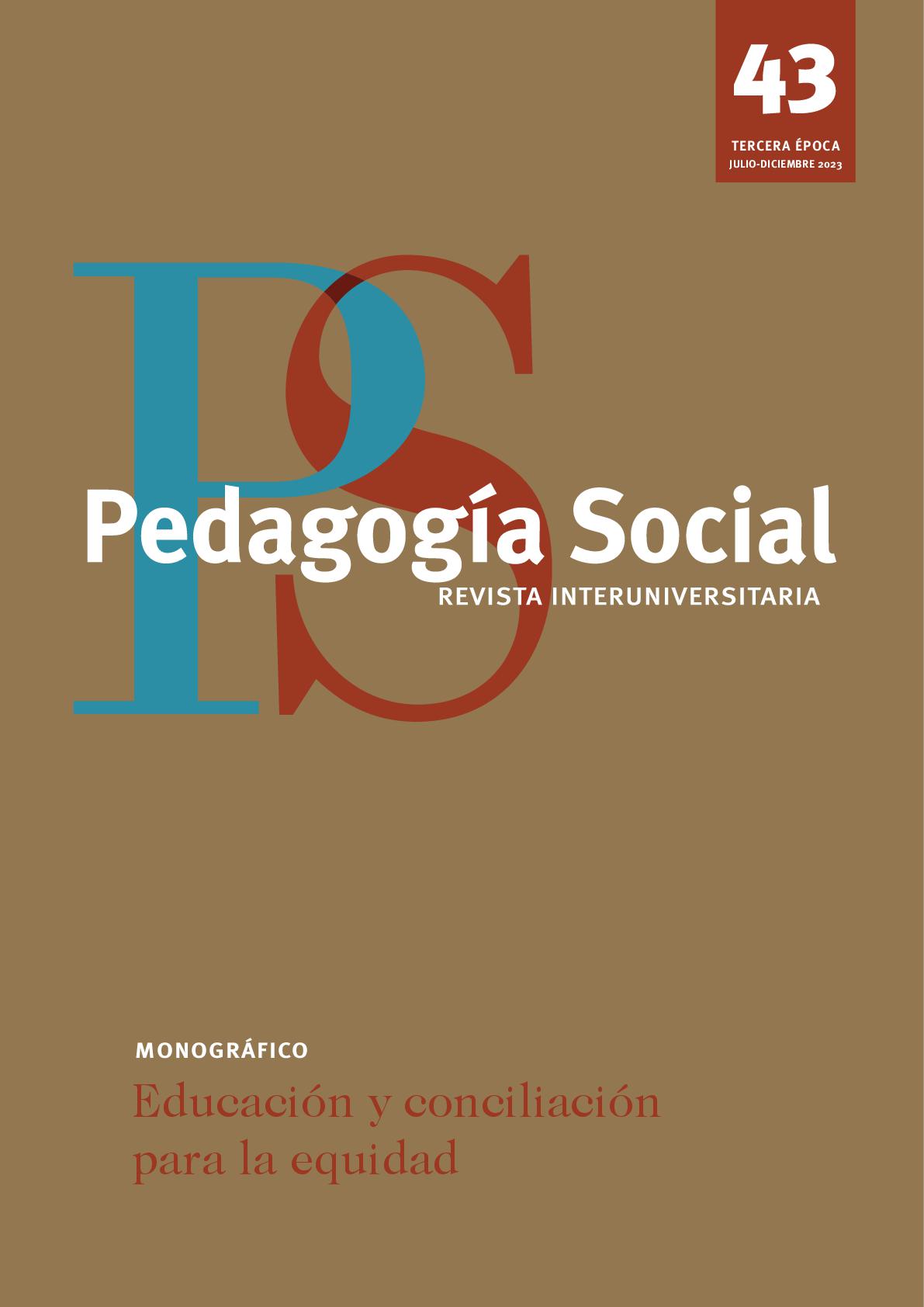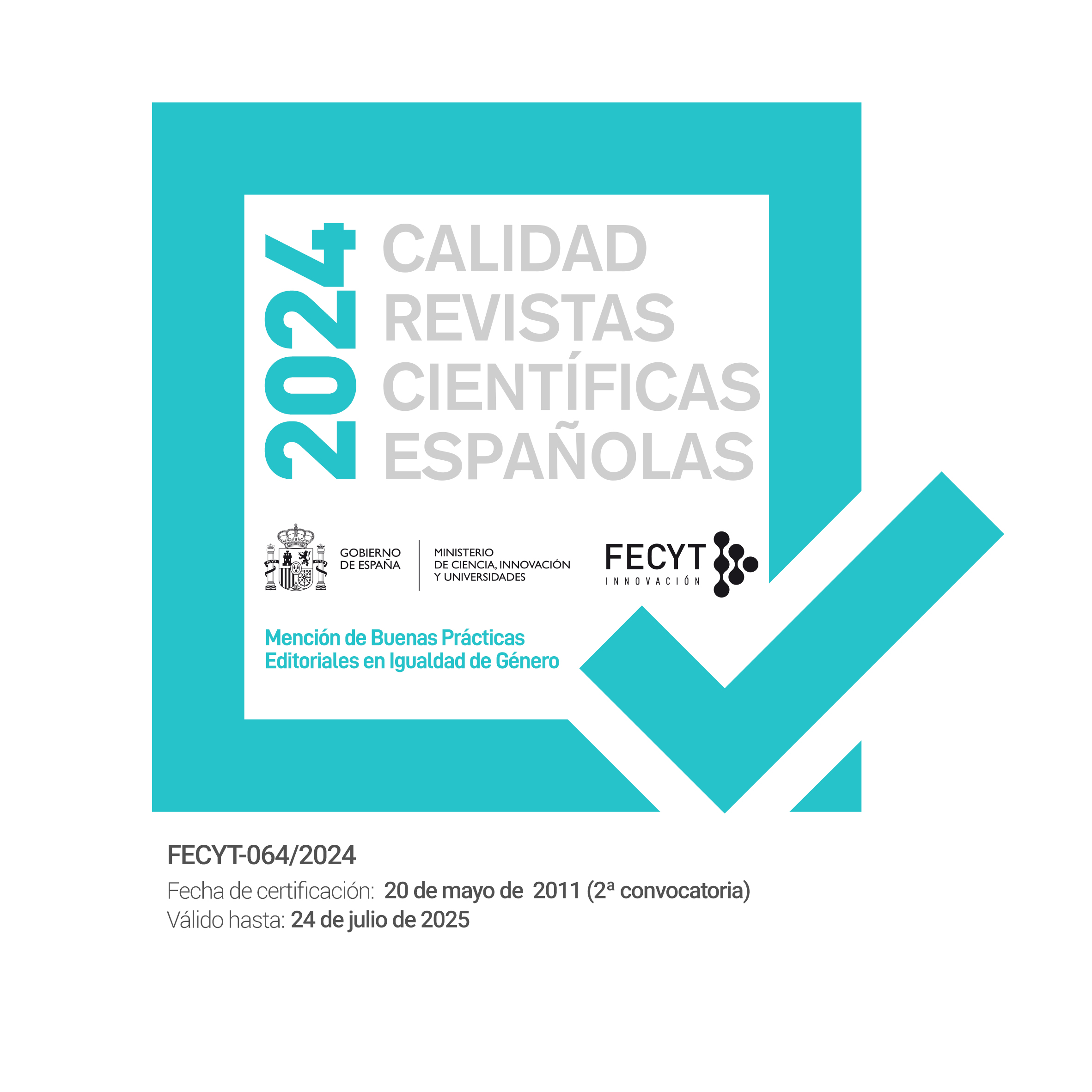Leisure time from the perspective of children. Contributions of an action-research
DOI:
https://doi.org/10.7179/PSRI_2023.43.05Keywords:
childhood, leisure, participation, action research, leisure educationAbstract
The management of children daily time is subordinated to a school organisation that prioritises the needs of the adults over their rights. Children’s free time is articulated around excessive school assignments, participation in extracurricular activities and difficulties in reconciling work and family life. Moreover, these issues were exacerbated by the health crisis resulting from the COVID-19 pandemic. The aim of this study is to identify the needs and attitudes of children with respect to their leisure time, considering the influence of gender and age. The action-research experience was conducted in collaboration with the Forum for Child and Adolescent Participation of the City Council of Teo (A Coruña) –within the framework of the CON_TIEMPOs project–, was based on the application of an ad hoc questionnaire to 573 students from 6th grade of primary school to 4th grade of secondary school. Even though most students reported being satisfied with their leisure practices, the results show difficulties in enjoying free time and reconciling study time and extracurricular activities, a situation experienced to a greater extent by women than men, as well as by students in more advanced grades. Thus, the expressed a lack of knowledge about the leisure offered in their municipality, minimal participation in these types of activities and a lack of interest in engaging more in them. The conclusions point to the importance of recognizing the current dynamics of children in relation to the management of their social and leisure time, considering their assessment in the implementation of socio-educational policies that contribute to their well-being and designed considering a differential approach and gender perspective.
Downloads
References
Andrés, C., Rodrigo-Moriche, M. P. y Valdivia, P. (2021). El ocio en la primera infancia desde un enfoque humanista en tiempos de pandemia. Edetania. Estudios y propuestas socioeducativas, 60, 143-164. https://doi.org/10.46583/edetania_2021.60.947
Araújo, E. (2018). Para uma perspectiva aplicada do tempo na política. Revista de Estudios Sociales, 65, 63-72. https://doi.org/10.7440/res65.2018.06
Araújo, E. (2020). Tiempo, sociedad y culturas: una aproximación teórica y metodológica. En J. A. Caride, M. B. Caballo y R. Gradaílle (Coords.), Tiempos, educación y ocio en una sociedad de redes (pp. 15-30). Octaedro.
Caballo, M. B., Caride, J.A. y Meira, P. A. (2011). El tiempo como contexto y pretexto educativo en la sociedad red. Educación Social. Revista de intervención socioeducativa, 47, 11-24. https://raco.cat/index.php/EducacioSocial/article/view/238960
Caballo, M. B., Varela, L. y Martínez-García, R. (2020). La educación familiar del ocio: una responsabilidad compartida. En J. A. Caride, M. B. Caballo y R. Gradaílle (Coords.), Tiempos, educación y redes (pp. 123-138). Octaedro.
Caballo, M. B., Varela, L. y Nájera, E. (2017). El ocio de los jóvenes en España. Una aproximación a sus prácticas y barreras. OBETS. Revista de Ciencias Sociales, 12(3), 43-64. https://doi.org/10.14198/OBETS2017.12.1.11
Caride, J. A. (2014). Del ocio como educación social a la pedagogía del ocio en el desarrollo humano. Edetania. Estudios y propuestas socioeducativas, 45, 33-53. https://revistas.ucv.es/edetania/index.php/Edetania/article/view/171
Caride, J. A., Lorenzo, J. J. y Rodríguez Fernández, M. A. (2012). Educar cotidianamente: el tempo como escenario pedagógico y social en la adolescencia escolarizada. Pedagogía Social. Revista interuniversitaria, 20, 19-60. https://doi.org/10.7179/PSRI_2012.20.01
Cohen, J. (1992). Statistical Power Analysis. Current Directions in Psychological Science, 1(3), 98-101. https://doi.org/10.1111/1467-8721.ep10768783
Colmenares, A. M. (2012). Investigación-acción participativa: una metodología integradora del conocimiento y la acción. Voces y Silencios: Revista Latinoamericana de Educación, 3(1), 102-115. https://doi.org/10.18175/vys3.1.2012.07
Cosma, A., Pavelka, J. y Badura, P. (2021). Leisure Time Use and Adolescent Mental Well Being: Insights from the COVID-19 Czech Spring Lockdown. International Journal of Environmental Research and Public Health, 18(23), 12812. https://doi.org/10.3390/ijerph182312812
Cuenca, M. (2006). Pedagogía del ocio, una aproximación global. En M. Cuenca (Coord.), Aproximación multidisciplinar a los Estudios de Ocio (pp. 83-101). Universidad de Deusto.
Cuenca, M. (2021). Sentidos del ocio infantil y desarrollo. Terra. Revista de Desarrollo Local, 8, 645-661. https://doi.org/10.7203/terra.8.21006
De Juanas, A., García-Castilla, F. J. y Ponce de León, A. (2020). El tiempo de los jóvenes en dificultad social: utilización, gestión y acciones socioeducativas. Revista Española de Pedagogía, 78(277), 477-495. https://doi.org/10.22550/REP78-3-2020-05
De la Cruz, M. (2006). Una lectura ética sobre la incidencia del ocio en nuestra sociedad. En M. Cuenca (Coord.), Aproximación multidisciplinar a los Estudios de Ocio (pp. 59-81). Universidad de Deusto.
Delgado, P., Pose, H. y De Valenzuela, A. L. (2015). El ocio cotidiano de los estudiantes de Educación secundaria en España. Pedagogía Social. Revista interuniversitaria, 25, 25-49. https://doi.org/10.7179/PSRI_2015.25.02
De Valenzuela, A. L, Martínez-García, R. y Escobar-Arias, D. (2021). Prácticas de ocio y tiempo libre de los adolescentes en Galicia: análisis y reflexiones en clave socioeducativa. Bordón, 73(1), 161-17. https://doi.org/10.13042/Bordon.2021.83201
Feito, R. (2020). Este es el fin de la escuela tal y como la conocemos. Unas reflexiones en tiempos de confinamiento. Revista de Sociología de la Educación, 13(2), 156-163. https://doi.org/10.7203/RASE.13.2.17130
Formoso, M. (2022). El derecho al ocio: un análisis desde el enfoque de pobreza multidimensional. En F. T. Añaños, M. M. García-Vita y A. Amaro (Coords.), Justicia social, género e intervención socioeducativa (pp. 141-149). Ediciones Pirámide.
González, J. L., Evangelista, A. y Espinosa, C. (2021). Efectos de la pandemia en la trayectoria educativa de niñas, niños y adolescentes: lecciones desde Chiapas, México. Religación. Revista de Ciencias Sociales y Humanidades, 6(27), 53-68. https://doi.org/10.46652/rgn.v6i27.771
Hernández Prados, M. A. y Álvarez Muñoz, J.S. (2017). El ocio punto de inclusión o exclusión. Una mirada crítica. En II Congreso Online sobre Desigualdad Social, Económica y Educativa en el Siglo XXI. https://cutt.ly/B8JN4X8
Hosokawa, R. y Katsura, T. (2021). Maternal Work-Life Balance and Children’s Social Adjustment: The Mediating Role of Perceived Stress and Parenting Practices. International Journal of Environmental Research and Public Health, 18(13), 6924. https://doi.org/10.3390/ijerph18136924
Jacovkis, J. y Tarabini, A. (2021). COVID-19 y escuela a distancia: viejas y nuevas desigualdades. Revista de Sociología de la Educación, 14(1), 85-102. https://doi.org/10.7203/RASE.14.1.18525
Kleiber, D. A., Bayón, F., Cuenca, J. y Monteagudo, M. J. (2014). La contribución del ocio experiencial valioso al envejecimiento satisfactorio: estudio de los estilos de ocio de las personas mayores de Euskadi. Inguruak. Revista vasca de sociología y ciencia política, 57-58, 2347-2364.
Latorre, A. (2007). La investigación-acción. Conocer y cambiar la práctica educativa. Grao.
Lazcano, I. y De Juanas, A. (2020). Presentación. En I. Lazcano y A. De Juanas (Coords.), Ocio y juventud. Sentido, potencial y participación comunitaria (pp. 7-12). UNED.
Leyra, B. y Barcenas, A. M. (2014). Usos, discursos y reflexiones sobre el ocio infantil: aproximación etnográfica en la Comunidad de Madrid. En P. Cucalón (Coord.), Etnografía de la escuela y la interseccionalidad (pp. 63-70). Traficantes de Sueños.
Maroñas, A., Martínez García, R. y Gradaílle, R. (2019). Educación del ocio en y con la comunidad. Aportes desde la pedagogía social. Perfiles educativos, 41(163), 94-108. https://doi.org/10.22201/iisue.24486167e.2019.163.58686
Martínez-Vicente, M., Suárez-Riveiro, J. M. y Valiente-Barroso, C. (2020). Implicación estudiantil y parental en los deberes escolares: diferencias según el curso, género y rendimiento académico. Revista de Psicología y Educación, 15(2), 151-165. https://doi.org/10.23923/rpye2020.02.193
Monteagudo, M. J., Ahedo, R. y Ponce de León, A. (2017). Los beneficios del ocio juvenil y su contribución al desarrollo humano. OBETS. Revista de Ciencias Sociales, 12(3), 177-202. https://doi.org/10.14198/OBETS2017.12.1.17
Morán, C. y Cruz, L. (2011). Vida cotidiana, tiempos escolares y derechos de la infancia. Educación Social. Revista de intervención socioeducativa, 47, 84-94. https://raco.cat/index.php/EducacioSocial/article/view/238972
Morata, T., Palasí, E. y Rocha, J. A. (2020). Ocio y participación juvenil: el tiempo libre educativo como espacio de aprendizaje y práctica de la participación. En I. Lazcano y A. De Juanas (Coords.), Ocio y juventud: sentido, potencial y participación comunitaria (pp. 181-202). UNED.
Novella, A. (2012). La participación infantil: concepto dimensional en pro de la autonomía ciudadana. Education in the Knowledge Society, 13(2), 380-403. https://doi.org/10.14201/eks.9015
Orben, A. y Przybylski, A. K. (2019). Screens, Teens, and Psychological Well-Being: Evidence From Three Time-Use-Diary Studies. Psychological Science, 30(8), 682-696. https://doi.org/10.1177/095679761986
Ortega, C. y Bayón, F. (2014). Introducción. En C. Ortega y F. Bayón (Coords.), El papel del ocio en la construcción social del joven (pp. 9-14). Universidad de Deusto.
Oyarzún, D. y Reyes, M. I. (2021). Bienestar y tiempo libre de niños y niñas a través de un mapeo fotográfico participativo. Revista de Psicología, 30(2), 1-15. https://doi.org/10.5354/0719-0581.2021.65689
Rodrigo-Moriche, M. P. y Vallejo, S. I. (2018). Nuevos horizontes de ocio y participación infantil: construyendo ciudadanía desde los intereses y necesidades de los niños, niñas y adolescentes (NNA). En A. Madariaga y A. Ponce de León (Coords.), Ocio y participación social en entornos comunitarios (pp. 213-233). Universidad de La Rioja.
Sanz, E., Sáenz, M. y Cano, R. (2018). Actitudes de padres e hijos hacia un ocio compartido en familia. Pedagogía social. Revista Interuniversitaria, 32, 59-70. https://doi.org/10.7179/PSRI_2018.32.05
Stoilova R., Ilieva-Trichkova, P. y Bieri, F. (2020). Work–life balance in Europe: institutional contexts and individual factors. International Journal of Sociology and Social Policy, 40(3/4), 366-381. https://doi.org/10.1108/IJSSP-08-2019-0152
Varela, A., Fraguela-Vale, R. y López-Gómez, S. (2021). Juego y tareas escolares: el papel de la escuela y la familia en tiempos de confinamiento por la COVID-19. Estudios sobre Educación, 41, 27-47. https://doi.org/10.15581/004.41.001
Varela, L., Gradaílle, R. y Teijeiro, Y. (2016). Ocio y usos del tiempo libre en adolescentes de 12 a 16 años en España. Educaçao e Pesquisa, 42(4), 987-999. http://dx.doi.org/10.1590/S1517-9702201612152404
Varela. L., Martínez-Figueira, M. E. y Pose, H. M. (2015). Programas de conciliación nos tempos cotiáns da infancia en Galicia. Revista de Estudios e Investigación en Psicología y Educación, 5, 117-121. https://doi.org/10.17979/reipe.2015.0.05.439
Wallace, J. E. y Young, M. C. (2010). Work hard, play hard? A comparison of male and female lawyers’ time in paid and unpaid work and participation in leisure activities. Canadian Sociological Association, 47(1), 27-47. https://doi.org/10.1111/j.1755-618X.2010.01221.x
Downloads
Published
How to Cite
Issue
Section
License

This work is licensed under a Creative Commons Attribution-NonCommercial-ShareAlike 4.0 International License.
Copyright and right to archive
The published version of the articles can be self-archived by their authors in open access institutional and thematic repositories. However, Pedagogía Social. Revista Interuniversitaria must authorize partial or global reutilisation on new papers or publications.
Published papers must be cited including the title of the journal Pedagogía Social. Revista Interuniversitaria, issue, pages and year of publication
Ethical responsibilities
Pedagogía Social. Revista Interuniversitaria does not accept any material that has been previously published in other documents or publications. Authors are responsible for obtaining the required permissions for partial or global reproduction any material from other publications, and to correctly quote its origin.
Pedagogía Social. Revista Interuniversitaria is obliged to detect and report fraudulent practices.
Only those who have intellectually contribute to the development of the paper must appear as authors.
The journal expects authors to declare any commercial partnership that might entail a conflict of interest with respect to the submitted article.
Authors must mention in the article, preferably in the “methodology” section, that the procedures used during the samplings and controls have been made after getting informed consent.
The journal will not use any received contribution in a way other than the goals described in these guidelines.
Copyright Notice
© Pedagogía Social. Revista Interuniversitaria. Papers published in both the printed and online versions of this Journal are property of Pedagogia Social. Revista Interuniversitaria, being required to cite the source in any partial or total reproduction.
Unless otherwise stated, all content of this electronic journal is distributed under "Creative Commons Attribution-Non commercial 3.0 Spain" (CC-by-nc) license for use and distribution. The informative version and the legal text of this license is available here. This has to be expressly stated in this way when necessary.






